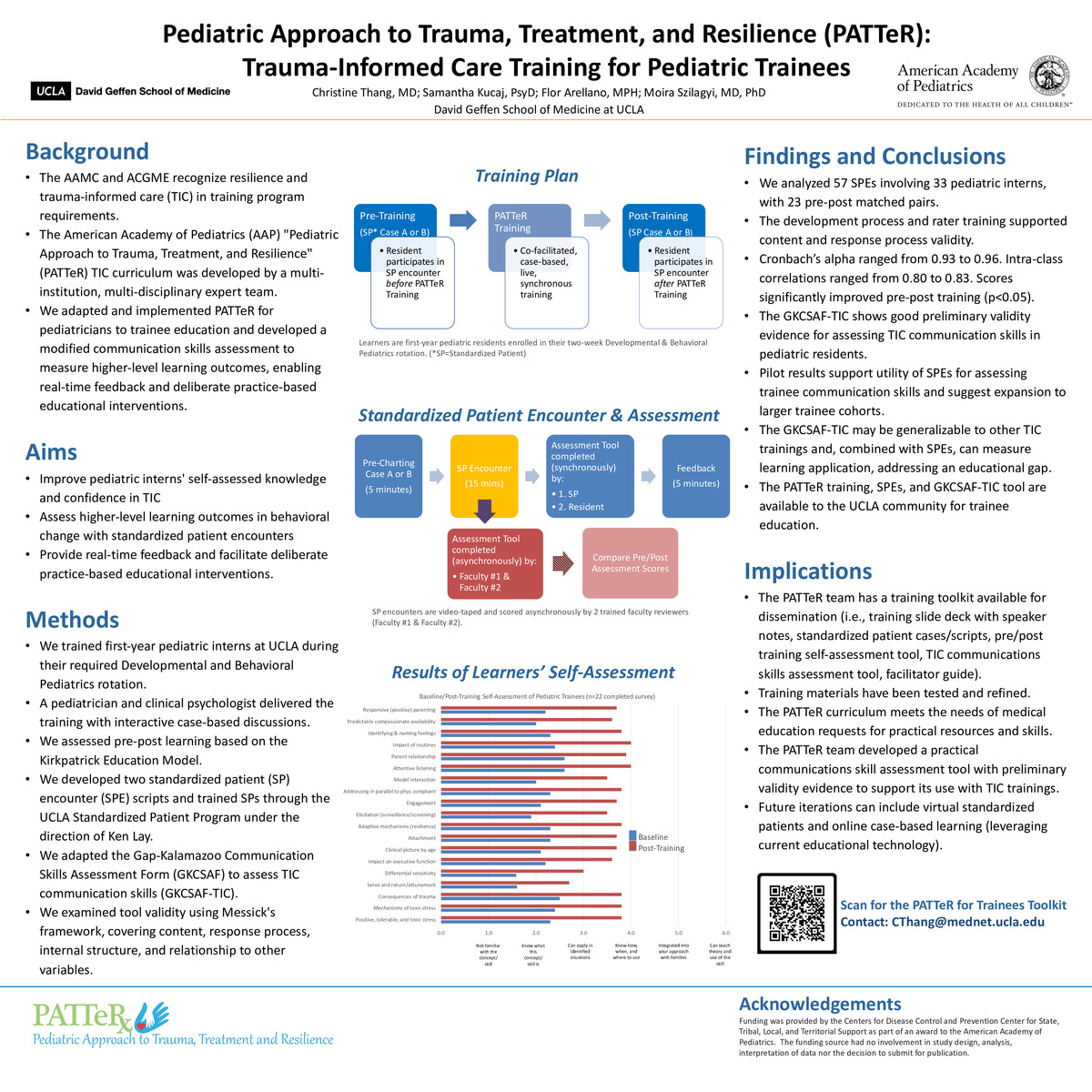
-
Author
Christine Thang -
Poster Title
Pediatric Approach to Trauma, Treatment, and Resilience (PATTeR) Training for Pediatric Trainees: Trauma-Informed Care Training with Standardized Patients and Communication Skills Assessment
-
Author(s)
Christine Thang, MD – Assistant Clinical Professor, General Pediatrics, David Geffen School of Medicine at UCLA
Samantha Kucaj, PsyD – Psychologist, Developmental and Behavioral Pediatrics
Cambria L Garell, MD - Associate Clinical Professor, General Pediatrics, David Geffen School of Medicine at UCLA
Kiran Mitha Masood, MD - Associate Clinical Professor, General Pediatrics, David Geffen School of Medicine at UCLA
Ken Lay, MA - UCLA Simulation Center
Flor Arellano, MPH – Researcher, General Pediatrics, David Geffen School of Medicine at UCLA
Moira Szilagyi, MD, PhD – Professor, General Pediatrics, David Geffen School of Medicine at UCLA
-
Contact Author Email
CThang@mednet.ucla.edu
-
Poster Abstract
Background: The AAMC and ACGME recognize trauma-informed care (TIC) and resilience training in their program requirements. The American Academy of Pediatrics (AAP) "Pediatric Approach to Trauma, Treatment, and Resilience" (PATTeR) TIC curriculum was developed by a multi-institution, multi-disciplinary expert team. We adapted and implemented PATTeR for trainee education and developed a modified communication skills assessment to measure higher-level learning outcomes, enabling real-time feedback and deliberate practice-based educational interventions.
Methods: Using the adapted PATTeR curriculum, we trained interns at a single site. A pediatrician and clinical psychologist delivered the training with interactive case-based discussions. We assessed pre-post learning based on the Kirkpatrick education model. We developed two standardized patient encounter (SPE) scripts and adapted the Gap-Kalamazoo Communication Skills Assessment Form (GKCSAF) to assess TIC communication skills (GKCSAF-TIC). Its validity was examined using Messick's framework, covering content, response process, internal structure, and relationship to other variables.
Results: We analyzed 57 SPEs involving 33 pediatric interns, with 23 pre-post matched pairs. The development process and rater training supported content and response process validity. Cronbach’s alpha ranged from 0.93 to 0.96. Intra-class correlations ranged from 0.80 to 0.83. Scores significantly improved pre-post training (p<0.05).
Conclusions: The GKCSAF-TIC shows good preliminary validity evidence for assessing TIC communication skills in pediatric residents. Using SPEs for TIC communication skills assessment suggests potential application with larger trainee cohorts. The GKCSAF-TIC may be generalizable to other TIC trainings and, combined with SPEs, can measure learning application, addressing an educational gap. We share this tool and the PATTeR training with the DGSOM medical education community for implementation consideration.
-
Keywords
medical education, curriculum, assessment, simulation, teamwork, feedback
-
Poster PDF

